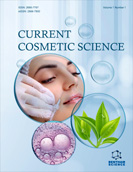Abstract
A less or excess production and distribution of melanin pigment leads to pigmentary disorders in human beings. Reduced melanin production results in hypopigmentation, whereas its excess production results in hyperpigmentation. There are several intrinsic and extrinsic factors that are responsible for causing these disorders. Many proteins and enzymes are involved in the complex process of pigmentation called melanogenesis. Any defect in the proteins or enzymes and/or any pathway of melanogenesis due to any of the factors may cause pigmentary disorders. There are certain things that have to be taken care of in order to avoid the dysfunctioning of the components of melanogenesis. Such things include some drugs, chemical reagents, hair dyes, food allergens, prolonged use of antibiotics, use of certain natural allergens, excessive sun exposure etc. The present chapter is dedicated to the effects of these things on skin pigmentation and the preventive approach to overcome the problems of skin hypopigmentation and hyperpigmentation caused by them.
Keywords: Food allergens, Melanin, Melanogenesis, Pigmentary disorders, Sun exposure.

















